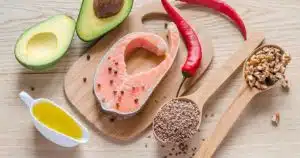Uggghh… There’s nothing worse than feeling bloated. You feel full but have hardly eaten anything. You look about 6 months pregnant and as people know you’re trying to conceive, people ask when your baby is due (not what you want to hear when you’re struggling to conceive anyway). The clothes that you love and normally fit you just don’t feel comfortable anymore. Bloating and PCOS seem to go hand in hand.
I know that I’m not the only one who feels like this on occasion as many of you have asked me to look into how we can beat the bloat with Polycystic Ovarian Syndrome.
What Causes Bloating with PCOS?
Bloating is a common symptom of PCOS and many women with a normal hormonal profile will also experience bloating occasionally. Let’s try and figure out the culprit that is causing us to feel bloated.
Hormone Imbalance

Estrogen in particular causes us to retain water. One lovely lady asked me recently why she looked thinner or less bloated when she finally had her period after 4 months without it. Well, Estrogen would be the culprit. Before ovulation, estrogen levels are high and drop when progesterone levels rise during menstruation. The dropping Estrogen levels help to relieve the water retention and subsequent bloating.
Gut Flora
We all have bacteria and yeast living in our gut that help with digestion. But sometimes they can get out whack with too much of one kind and not enough of another.
If you’re lacking in some bacterias, your food may not be digested properly. This leads to the food fermenting and you become bloated.
Also, yeasts produce gas which leads to bloating. And, yeasts loved refined sugars and alcohol. So, reducing wheat and refined sugars should help avoid bloating. (2)
Food intolerances

- Abdominal pains
- Acid reflux
- Bloating
- Constipation
- Diarrhoea
- IBS (Irritable Bowel Syndrome)
- Nausea
In a food intolerance, you can get the same symptoms but you do not have the full autoimmune response.
Ovarian Hyperstimulation Syndrome
This one is particularly important for women with PCOS who are using fertility drugs. OHSS is caused by stimulation of the ovaries to produce eggs. It can be caused by Clomifene or HCG and having PCOS greatly increases your risk of OHSS (5)
Symptoms of OHSS include:
- Bloating
- Nausea
- Vomiting
- Abdominal pain
If you are undergoing fertility treatments and you experience any of these symptoms, you need to be seen by your doctor!
Right, so now that we have looked at the causes of bloating in women with PCOS, let’s look at how we can deal with bloating.
Beat the Bloat
Balance your hormones
I know that this is often easier said than done but it is fundamental to managing your PCOS and is exactly what this whole website is dedicated to. If you can manage your insulin and testosterone levels through diet and exercise in particular (this addresses the underlying pathology of PCOS instead of simply relying on drugs) you should have a return of your cycle. This will normalize your estrogen and progesterone levels and will relieve some of your bloating (6).
There are plenty of articles throughout this site that will help you to make those dietary changes but if you need some more guidance, check out PCOS Foodies for more information on our weekly meal plans…
Exercise
Movement and exercise helps with the movement of food and air through the digestive tract so it will help to alleviate bloating (7) – not to mention all of the other benefits of exercise as it specifically relates to polycystic ovarian syndrome).
Drink spearmint tea

I order mine online from Amazon as I struggle to find it in health food stores or my grocery store. Alvita have a highly rated Spearmint tea on Amazon.
Take Probiotics
Probiotics help to balance flora that lives in your gut and will help to alleviate bloating (9). The most common source of probiotics is yoghurt. This leads to a little bit of a dilemma as we’ve already said we should eliminate dairy.
Well, the IGF-1 content (which causes a rise in our testosterone levels and is really problematic for PCOS) is significantly reduced by the fermentation process (10). So, I would suggest that yoghurt with live cultures is a good source of probiotics for women with PCOS. Just be careful of the carbohydrate content and artificially sweetened yoghurts. A plain Greek yoghurt is probably your best bet.
Up your Potassium

Summing it Up
So, we know that bloating is common for so many of us with PCOS and it can leave us feeling uncomfortable in our own skin. It is often caused by:
- Hormonal imbalance
- Gut flora
- Food intolerance
- Ovarian hyperstimulation syndrome
It can be dealt with, though, and you can manage your bloating by:
- Balancing your hormones
- Exercising regularly
- Drinking spearmint tea (yum!)
- Taking probiotics
- Upping your potassium intake
So many of us are trying to lose weight and even just dealing with the bloating is a great start in the right direction. If you have any other tried and tested ways for dealing with bloating, please let me know in the comments below! I always love hearing from you!
- sustainable pcos weight loss strategies
- Over 5500 women have done it and seen results
- [bonus] combat cravings kit
- [bonus] intermittent fasting for pcos course
- [BONUS] personalised nutrition plan
JOIN OVER 5,500 OTHERS







